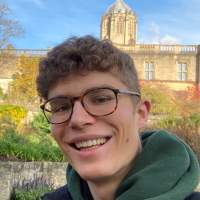Enrich 2024 was a two-night conference that brought together students from a variety of different academic disciplines to discuss how we can live and speak for Jesus in our particular university and workplace contexts. The weekend consisted of talks on the Beatitudes (Matthew 5:1-12) and being Salt and Light (Matthew 5:13-16), with additional seminars on technology and social/power dynamics in the workplace. However, at the heart of Enrich were the respective network sessions where we took a deep dive into the particular opportunities and challenges of being a Christian within the world of music.
The Music Network sessions
Music Network co-ordinator Tom Chevis showed us that engaging our studies with the gospel is not just something we can do, but something we should do. In stressing that we are not saved by good works, we sometimes forgot that we are saved for good works. Our whole lives should be submitted to the Lordship of Christ, including every bit of music-making, whether that be listening, composing, performing, conducting, teaching, or writing about music.
Sometimes this can be more obvious than others, for example: trusting in God’s promises of His presence and peace during examined recitals, composing music that might echo biblical stories or narratives, giving out words of encouragement to fellow musicians when leading a group rehearsal. However sometimes it’s less obvious: how does being a Christian affect the way I practise my instrument? Do I have to compose a piece that is overtly ‘Christian’? How can I write this analytical essay to the glory of God? This is what Enrich is about, to dig deeper into those questions. It takes time and discipline, and often there are not necessarily right and wrong answers, but it is completely worth it!
For each music network session one participant gave a presentation, unpacking how their chosen piece of music and performance or composition context could be seen through the lens of the gospel. To structure the presentation, we were encouraged to think about five questions laid out by Ted Turnau in his book Popologetics:
- What’s the story?
- What’s the context?
- What is good, true, and beautiful?
- What is false, ugly, and deceitful?
- How does the gospel apply?
[Ed: see this article by Becky Chevis which outlines this process.]
My presentation
I chose to present on Biber’s Passacaglia for Solo Violin in G minor (YouTube recording here) which I had recently performed in an examined recital. The piece offers listeners a glimpse into the rich tapestry of Baroque music and the devotional context in which it was created. As a group we explored how the slow, plodding 'footsteps' of the solo violin could be reflective of Christ’s anguished prayers in the garden of Gethsemane and journey to Golgotha. Furthermore, I performed this in a recital that functioned as my final university exam, and was attended by many friends who had already finished their exams. To some extent their presence functioned as a type of eschatological community: just as the saints in heaven cheer on those still pilgrimaging through this earth (Hebrews 12:1), so did the audience cheer me on as I approached the finishing line of my degree! While some of this thinking may seem slightly conceptual, it is interesting to think about how the content and context of music reflects the truths of the Bible and can be seen through a gospel lens.
Giving more focused attention to our music-making
Following on from Enrich, I hope that I can give more focused attention to my music-making, aiming to see how the pieces I play, write about, and conduct reflect or distort gospel truth, and how I engage with them can exalt Christ as Lord rather than myself. Music is a blessing from the Lord, and should be used to bless and serve both the Lord and the people around us. May I make all my musical activities more about others than myself.
A fantastic weekend
Amidst the various seminars, talks, and discussions, it was lovely to get to know students from other Leadership Networks. Sometimes this took the form of in-depth discussions over dinner, but more often it involved facepainting each other as famous politicians, filming David Attenborough-style documentaries, and attempting to skateboard! Overall, Enrich was a fantastic weekend that excited and equipped us with the tools to think deeply about how every bit of music-making can be submitted to the Lordship of Christ.

